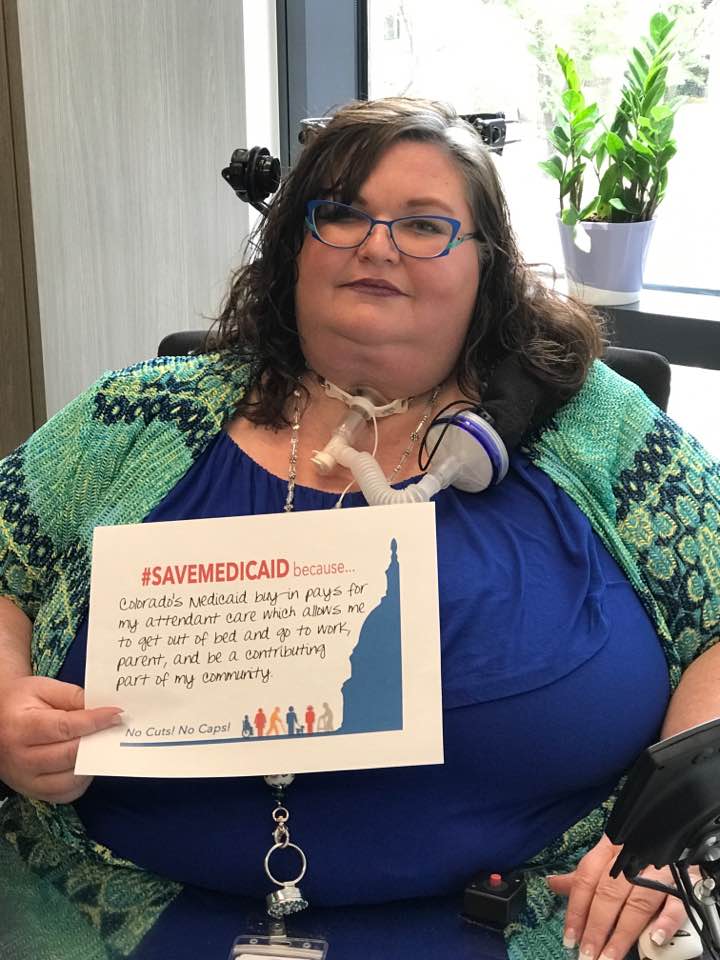Advice on Advocating for Medicaid: Be An Artichoke!

image description: photo of an artichoke on a black background with text that says “BE AN ARTICHOKE. Prickly on the outside. Big heart on the inside. The vegetables of the world are uniting, and we’re not going away!”
Advice on Advocating for Medicaid: Be An Artichoke!
Editor’s Note: Carrie Ann Lucas is a long time member of Parent to Parent and a former Advisory Board member. She is an attorney and advocate for children and youth with disabilities, adults with disabilities and parents with disabilities. Carrie, who lives with significant disabilities, works and lives an active, independent life in her home and community and parents her 4 children who also have disabilities. Her life IS the vision of Parent to Parent: that parents and their sons and daughters are integral valued members of society with a voice in shaping their chosen communities. Carrie wrote a compelling Facebook post last week, and with her permission, we are publishing it here.
I finished reading the healthcare bill a bit ago. The Senate version really is much worse than the House version for disabled and poor people. The cuts to Medicaid are draconian. The elected representatives who vote for this bill are saying my life doesn’t matter. My children’s lives don’t matter. It is better to lock us up in institutions, let us die quick and forget about us.
Medicaid is the primary insurer for people with severe disabilities. I am triply insured. I have insurance from my employer (and I am a government employee, so it is dammed good insurance). I also have Medicare. I am also covered by Medicaid. I pay a premium (a small one) for my private insurance ($50/mo). I pay a premium for Medicare ($134/mo). I pay a premium for Medicaid ($200/mo) Neither my private insurance or Medicare cover attendant care.
I need attendant care to help me in and out of bed, to get dressed, to assist with toileting, to help with cooking, taking medication, and most importantly keep my ventilator — life support equipment, working properly. I don’t use nurses. I hire attendants — non medical people who I train to do my care–because it is substantially cheaper. Medicaid pays for this care.

image description: photo of Carrie Lucas, a woman with long brown hair and blue glasses. She is seated in a wheelchair and is holding a sign that says #SaveMedicaid
Under the AHCA, the Medicaid cuts will force states to stop Medicaid waiver programs that allow people like me to access Medicaid. These waiver programs allow states to offer Medicaid to people who ordinarily won’t qualify due to income.
Because I have worked my entire adult life, and paid into Social Security, I don’t qualify for Medicaid without these waiver programs. Without these waiver services, I can’t continue to live in my home. I can’t continue to work. I can’t continue to parent my children. I can’t continue to volunteer in my community. I would not be a contributing member of my community!
Some lawmakers accused us of criticizing the bill without reading it. I would have read it had they released it. It’s now released and I read all 142 pages of the Discussion Draft while I rode home from work. (And I read all 184 pages of the American Health Care Act, and I have read all 906 pages of the Affordable Care Act).
Other legislators have said they support the Medicaid cuts, and want a free market approach for healthcare. That is exactly what we had prior to 2009, and our country suffered for it. People died so that insurance companies and their investors could get rich from denying necessary healthcare.
I am pissed off that the people in charge promote policies that will cause unnecessary deaths, and deaths of people like me and my family and friends. I am stubborn as hell, and will not go down without a fight. I saw someone call people with disabilities similar to mine “vegetables” and claimed the world was better off without us. We use too many resources; we should just die quick to benefit society.
Ed Roberts once said if he was going to be considered a vegetable, “I decided to be an artichoke – a little prickly on the outside but with a big heart on the inside. You know, the vegetables of the world are uniting, and we’re not going away!”
People might think I am more of a thistle (really prickly on the outside), but here is my artichoke. I am going to be quite prickly on the outside because I love my family. I love my community, and our survival depends on being a lot prickly right now.
